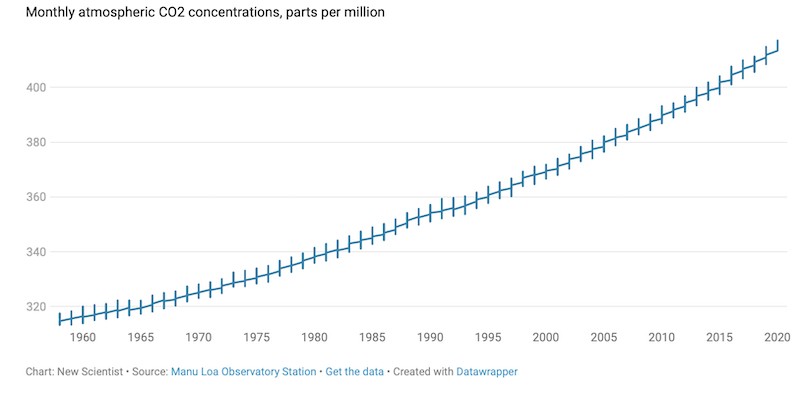Over the past few months, while we have been in the midst of the coronavirus lockdown, there have been a number of stories about how the Earth has been benefiting from reduce human activity. Early on, there were reports of the water in Venice clearing up for instance and later came the news that the Himalaya were now visible from hundreds of miles away. Since everyone was staying at home, keeping cars off the road and factories closed, it seemed that the environment was starting to heal itself. But last week, some sobering news was revealed indicating that despite a plethora of other challenges now facing the planet, climate change likely remains our biggest threat.
According to reports, May of 2020 was not only the warmest on record, it also gave us the highest carbon dioxide readings that we’ve ever seen as well. A new study indicates that since May of 2019, the amount of CO2 in the atmosphere has risen from 415 parts per million (ppm) to 417 ppm. That falls right in line with what scientists were expecting, but that number comes following two months of pandemic lockdown in which there was much less traffic on roads around the world and industrial centers were closed too. There was some hope that because of these shifts in how much carbon dioxide was being produced, we might see the numbers hold the same or even drop instead.
The continued rise in CO2 levels also resulted in the warmest May on record. On average, the planet was .63º C warmer than the average temperature recorded for that month from 1981 to 2010. That sticks closes to a trend that climatologists have been seeing over the past year, in which each month has been—on average—.7ºC warmer than average. Worst hit was Siberia, where the average temperature was fully 10ºC (18ºF) above normal. That’s a stunning number for sure and hopefully just an anomaly brought on by unusually warm weather. Still, researchers at the Copernicus Climate Change Service in Europe now say that the average temperature of the planet is up 1.26ºC since pre-Industrialization, which means we’re inching ever so much closer to that 1.5ºC number that U.N. Climate Change Conference indicated was the point of no-return when it came to doing irreparable harm to the environment.
The news wasn’t all bad however. According to NASA, there was a 30% drop in air pollution over the northwest U.S. in March. Meanwhile, CarbonBrief says that the shutdown of China’s industrial centers due to COVID-19 led to a 25% drop in carbon emissions as well. Those will likely only be speed bumps on the road however, particularly as the world starts to return to normal in the post-pandemic aftermath.
- Gear Review: The Xero Scrambler Mid is an Ultralight Hiking Shoe for Spring - March 1, 2023
- Gear Review: Yeti Roadie 48 Wheeled Cooler - August 18, 2022
- Kristin Harila Continues Pursuit of 8000-Meter Speed Record - August 16, 2022
